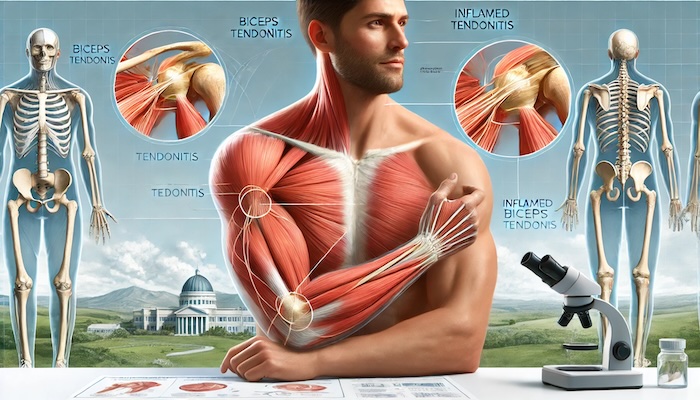
Biceps tendonitis is a common condition involving inflammation of the tendons connecting the biceps muscle to the shoulder and elbow. It often develops due to repetitive overhead motions or overuse, leading to irritation and microtears in the tendon. It's prevalent among athletes and individuals engaged in repetitive lifting or throwing activities.
Causes of Biceps Tendonitis
- Repetitive Stress: Activities like swimming, tennis, and weightlifting strain the biceps tendon.
- Age-Related Degeneration: Wear and tear can weaken tendons over time, increasing susceptibility to inflammation.
- Rotator Cuff Injuries: Associated conditions like shoulder impingement can exacerbate tendon irritation.
Symptoms
- Pain or tenderness in the front of the shoulder
- Weakness during overhead activities
- Swelling and stiffness in the shoulder joint
- Audible clicking or popping sounds when moving the arm
Diagnosis
A comprehensive diagnosis involves a physical examination to identify tenderness and restricted range of motion. Advanced imaging, such as ultrasound or MRI, may be used to confirm the extent of inflammation or associated injuries.
Treatment Options
At Precision Pain Care and Rehabilitation, the treatment of biceps tendonitis focuses on alleviating pain, promoting healing, and preventing recurrence. A multidisciplinary approach often includes:
- Conservative Management
- Rest and Activity Modification: Avoiding repetitive overhead motions reduces tendon stress.
- Physical Therapy: Stretching and strengthening exercises restore mobility and support healing.
- Medications: NSAIDs may be prescribed for pain relief and inflammation control.
- Interventional Pain Management
- Corticosteroid Injections: Targeted injections provide relief by reducing inflammation in the tendon sheath.
- Platelet-rich plasma (PRP) Therapy: Promotes natural healing by accelerating tissue regeneration through concentrated growth factors.
- Surgical Intervention
- Reserved for severe cases or tendon ruptures, minimally invasive arthroscopic surgery repairs and reattaches the tendon.
Prevention and Lifestyle Adjustments
- Gradual strengthening of shoulder and arm muscles
- Proper warm-up and stretching before physical activity
- Ergonomic modifications in workplaces or sports techniques
Interventional Pain Management’s Role
Interventional pain techniques at Precision Pain Care provide tailored, non-invasive options to manage chronic cases of tendonitis effectively. By addressing the root causes of pain through targeted therapies, patients experience quicker recovery and sustained relief.
Contact Precision Pain Care and Rehabilitation in Queens or Long Island today for personalized treatment options for biceps tendonitis.
Precision Pain Care and Rehabilitation has two convenient locations in Richmond Hill – Queens, and New Hyde Park – Long Island. Call the Queens office at (718) 215-1888 or (516) 419-4480 for the Long Island office to arrange an appointment with our Interventional Pain Management Specialists, Dr. Jeffrey Chacko or Dr. Sonny Ahluwalia.















